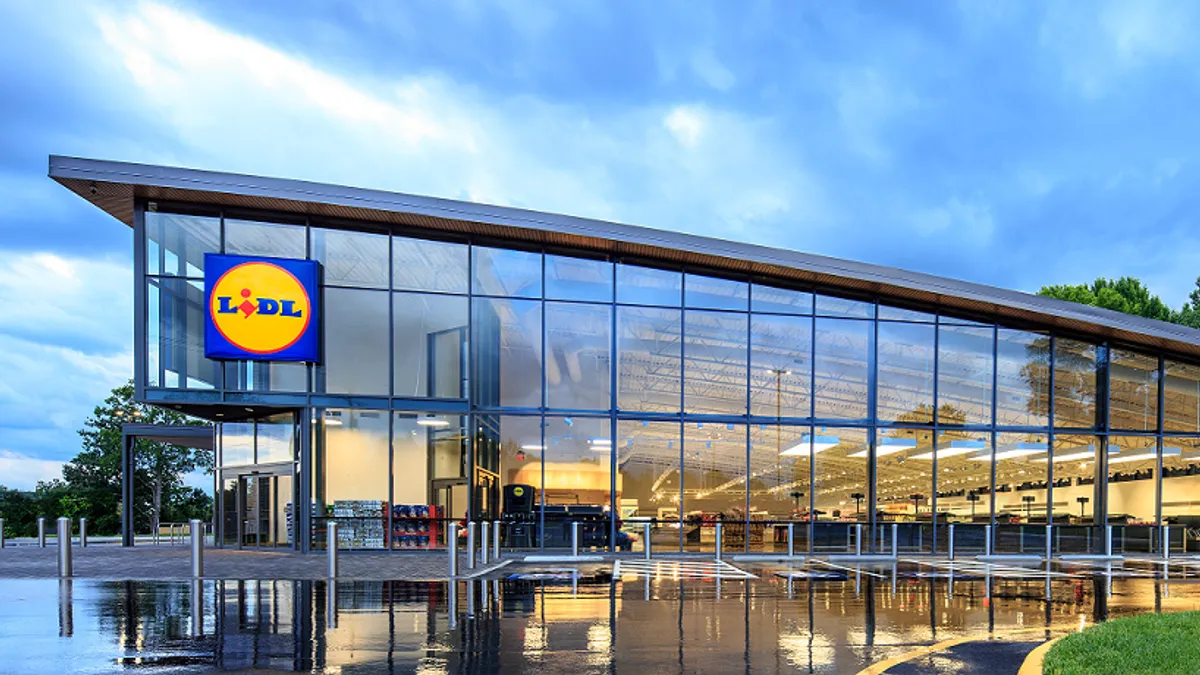Dive Brief:
- Grocers lower prices on private label products 9.3% on average in markets where Lidl operates — three times the typical reduction seen in areas Walmart enters, according to a study conducted by the University of North Carolina's Kegan-Flagler Business School. Retailers steeply discounted prices on staples like milk, which dropped 55% on average, and 30% on avocados and bread products.
- Researchers, who compared store brand prices in six markets that had Lidl stores with those in identical control markets without a Lidl presence, found that discounts varied by retailer. Aldi had the steepest price drops, at 19%, followed by Food Lion (15%) and Kroger (13%). Walmart and Publix both lowered prices 4% on average. Lidl, meanwhile, had the lowest prices in each market surveyed, averaging 25% lower than competitors and as much as 100% lower than Publix.
- The study was commissioned by Lidl but independently conducted, according to Katrijn Gielens, lead researcher and marketing professor at UNC Kenan-Flagler. Price checks occurred on Oct. 30, 2017 and compared 48 private label products across a range of categories, including meat, dairy, frozen foods and produce.
Dive Insight:
Lidl has a reputation for driving down prices in the markets it enters. Across Europe, the retailer has disrupted retailers with its steeply discounted private label offerings — part of a plan that involves making the competition play on its terms.
Grocers in the U.S. likewise prepared for Lidl's arrival by lowering prices at "unprecedented" levels, according to the lead researcher for this study, Katrijn Gielens. But Lidl hasn't rattled the competition as much as many expected, with reports indicating traffic declines in the discounters' first few months, and a pullback on store development.
The discounter's struggles indicate the competition has been tougher than it anticipated. Although Lidl expected competitors to drop prices, it may not have foreseen just how low they were willing to go, and how heavily and effectively they would play up value in their marketing efforts. In the weeks and months leading up to Lidl's arrival in the Mid Atlantic, retailers began coating their stores and circulars with low-price messaging. They took out print and TV ads, and pushed loyalty card promotions.
During a recent visit to stores in Henrico County, Virginia — one of the markets analyzed in the UNC study — Food Dive encountered heavy price messaging across a range of stores, from Wegmans to Walmart. Staple items were discounted to levels that were competitive with Lidl — including bananas, which went for as low as 29 cents per pound at Aldi. Wegmans offered three dozen large eggs for 99 cents.
The UNC study focused on private brands as a way of standardizing price comparisons, and because Lidl mainly sells private labels. And the results reflect the power and versatility of store brands in the U.S. Indeed, these grocers have the flexibility to lower prices swiftly and significantly in response to Lidl’s arrival. These products are much higher quality than in years past, too, and enjoy growing consumer loyalty as a result — something Lidl may have taken for granted.
Lidl also has execution problems to sort out. Analysts have noted its stores are too big, too reliant on nonfood products, and feature tepid fresh promotions, among other issues.
The discounter has been adjusting operations, offering more frequent produce promotions and announcing it’ll seek smaller store sites as it expands. The company maintains it's on track in the U.S., and has stressed its ability to adjust to market conditions.
In a conference call with reporters yesterday, Gielens, the lead UNC researcher and an expert on private brands, said Lidl will likely keep pricing pressure high on competing retailers. She also said that Lidl excels at playing the long game in new markets, and has the financial resources to absorb losses and ultimately improve its game.
"They're not driven by quarterly reports, and they really can sweat it out," she said. "They have a learn, adjust and go-ahead type of approach."








